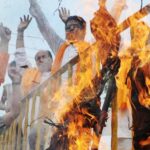22 of August is observed worldwide as International Day for Victims of Acts of Violence Based on Religious Beliefs. The General Assembly recognized the importance of providing victims of acts of violence based on religion or belief and members of their families with adequate assistance and encouragement in accordance with applicable law when it declared August 22 as the International Day Commemorating the Victims of Acts of Violence Based on Religion or Belief in its resolution. In India specifically as well as other parts of the world, there remain persistent acts of bigotry and violence motivated by religion or belief committed against people, notably Muslims.
Today, there is a growing tide of Islamophobia in the world and Muslims are being targeted and discriminated against through strict visa regimes and humiliating security checks at airports. International media also expresses its bias against Muslims- if a Muslim commits a crime he is termed a terrorist, while a white man, murdering children, is called mentally disturbed.
Since Indian-serving Prime Minister Narendra Modi took charge in 2014, situations of religious minorities in India have taken a drastic downward turn. When it comes to facing violent abuse, religious minorities in India are on the receiving end of the Hindutva policies of Modi. Bharatiya Janata Party (BJP) government allowed violence against minorities and their houses of worship to continue with impunity and also engaged in hate speech. Its prime example can be observed in the ongoing riots in the Indian state of Manipur and Haryana where prime targets are minorities.
Hindutva, followed by Modi and BJP is mainly inspired by Nazism which has destroyed India’s secular façade. In line with apartheid policies, the RSS-BJP nexus is bent upon turning India into a ‘Hindu Rashtra’. Hindutva ideology is based on the belief in Hindu hegemony and there should not be any place for minorities. Their extreme ideology advocates that minorities should also follow Hinduism or otherwise they have no right to live.
Amnesty International in its 2022 report titled, “Increase in unlawful killings in Jammu & Kashmir highlights Government’s failure to protect its minorities” reported that, for decades’ people of Jammu & Kashmir have suffered from gross human rights violations and abuses committed by both state and non-state actors. It stated that 87 civilians were killed by armed groups in IIOJK from 2019 to November 2021.
In February 2020, three days of violence erupted in Delhi with mobs attacking Muslim neighborhoods. There were reports of Delhi police who failed to halt attacks and even directly participated in the violence which resulted in the deaths of 50 people. Similarly, throughout 2019, BJP government’s actions continued enforcement of anti-conversion laws, and the Supreme Court’s ruling on Babri Mosque- created a culture of impunity for nationwide campaigns of harassment and violence against religious minorities, particularly Muslims. Mob lynching of persons suspected of cow slaughter or consuming beef continued, with most attacks occurring within BJP-ruled states. On another occasion in 2019, a mob in Jharkhand attacked a Muslim, Tabrez Ansari, forcing him to chant “Jai Shri Ram” as they beat him to death.
Violence against Christians in India also increased, with at least 328 violent incidents, often under accusations of forced conversion. These attacks frequently targeted prayer services and led to the widespread shuttering or destruction of churches. During 2019, discriminatory policies, anarchic and tolerance for violence against minorities at the national, state, and local level increased the climate of fear among non-Hindu communities.
Resultantly, the US Commission on International Religious Freedom recommended that the US State Department designate India as a “country of particular concern for engaging in and tolerating systematic and egregious religious freedom violations”. Moreover, it also recommends imposing sanctions on Indian government officials responsible for severe violations of religious freedom by freezing those individuals’ assets and barring their entry into the US.
There are only few examples of Indian discriminatory behavior towards its minorities but India has a history of normalizing violence against minorities, especially against Muslims and those who are particularly residing in IIOJK. Religious bigotry and extremism in India are not only a potential threat to itself but to the region and the world. The international community should take notice of India’s right-wing fascist propaganda aimed at systematic ethnic cleansing of Indian minorities.







